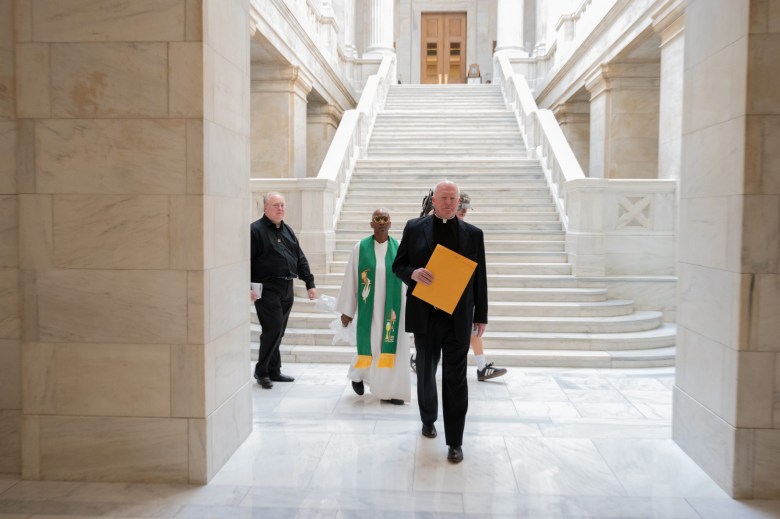The Trump administration sent $12,254,384 for after-school programs to the Arkansas Department of Education Monday, nearly three weeks after the July 1 date when federal education funds are typically distributed to states.
That $12 million payment to Arkansas represents only a fraction of the more than $58 million in education funding approved for the state by Congress in March, and which Arkansas expected to receive at the start of July.
The White House Office of Management and Budget released $1.3 billion in federal funding allocated for afterschool programs to states on Monday after a review. But the feds are still sitting on about $5.5 billion in annual funding that state education departments were anticipating receiving on July 1, with no word on when or if it will be released despite already being approved by Congress.
In early July, the White House
released a statement to States Newsroom
that said “many of these grant programs have been grossly misused to subsidize a radical left-wing agend a.”
The shortfall is already having consequences in Arkansas, where some federally funded positions remain unfilled and financial uncertainty is making it hard to plan for the 2025-26 school year.
On Monday, June 30, state education departments across the country received an email from
letting them know the federal education grant funding they were expecting to collect the next day was under review: “Accordingly, the Department will not be issuing Grant Award Notifications obligating funds for these programs on July 1 prior to completing that review.”
Some Arkansas educators had feared such cuts and delays, according to emails obtained from the Arkansas Department of Education through a Freedom of Information Act request.
On June 4, for example, Nathan White, director of the Southeast Arkansas Education Service Cooperative, reached out to the state education department in hopes of finding out if federal education funds earmarked to support migrant students would be forthcoming as usual. At the time, Damaris Tomlison, state director for migrant education programs, said there were no updates.
On June 18, De Queen School District Assistant Superintendent Misty Gentry reached out to Tomlison with the same concern. “Damaris, Are you hearing anything about not getting funding for migrant this year or next year?” she wrote.
“Not yet,” Tomlinson replied the same day. “As of right now we are conducting business as usual and continue planning for FY 25-26 until we hear otherwise.”
Advice from the state shifted after word came down that federal education funding was indeed on hold.
The delay sent school districts scrambling to pause or cancel programs and staff positions that rely on federal dollars.
In a July 1 email sent to Little Rock School District staff, Superintendent Jermall Wright said the district had to
immediately cancel
staff training and professional development scheduled for this summer and was reviewing other district programs and staff positions made possible by the federal funding.
Terry Darnell, director of instruction and federal programs for the Green Forest School District, emailed the state education department the morning of July 1 to find out what to do about an open paraprofessional job in the district’s migrant student program.
“If the para was paid with Migrant funds, I would not fill position at this time,” responded Jayne Green, the state education department’s coordinator of federal programs.
Also on July 1, Fayetteville Public Schools Deputy Superintendent Julie Williams sought guidance from ADE on buying supplies for summer school.
“Am I safe to order the last items on my list for summer school under the 21st Century Grant in lieu of the presidential cuts?” she asked.
“I would put spending on hold until we receive further guidance from DESE [Department of ] finance,” Tim Bullington, Arkansas’s 21st Century program coordinator, responded.
Federal 21st Century funding for after-school and summer-learning programs has since been released.
The Trump administration released the funds after facing increasing bipartisan pressure, according to a July 18
report from The New York Times
.
Many of the funds still being withheld are earmarked for programs that support English language learners and migrant students. Many of these programs are either eliminated or consolidated to a smaller pot of money in the White House’s proposed 2026 budget, The New York Times.
Kimberly Mundell, a spokesperson for the Arkansas Department of Education, said Arkansas’s allocation is a “slight increase” over fiscal 2025 and that “approved programs will receive full funding for the 2025-26 school year.”
It’s dragon-slaying time!
In a time when critical voices are increasingly silenced, the
Arkansas Times
stands as a beacon of truth, tirelessly defending the fundamental rights and freedoms within our community. With Arkansas at the epicenter of a sweeping culture war affecting our libraries, schools, and public discourse, our mission to deliver unflinching journalism has never been more vital. We’re here to “slay dragons” and hold power accountable, but we can’t do it alone. By contributing today, you ensure that independent journalism not only survives but thrives in Arkansas. Together, we can make a difference — join the fight.







